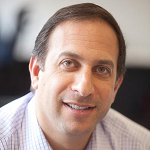 |
| Bind CEO Andrew Hirsch |
As Bind Therapeutics ($BIND) announced a major cut to its workforce yesterday after a set of mixed results for its lead cancer candidate, its CEO tells FierceBiotech that the company will need a major backer to push Bind-014's lung cancer trials forward--and he may be forced to sell the company.
The Cambridge, MA-based biotech released data on Wednesday for its nanoparticle Bind-014 Phase II iNSITE 1 trial in advanced non-small cell lung cancer (NSCLC) of squamous histology, as well as the iNSITE 2 trial in cervical and head and neck cancers.
Results for the first trial were OK but it will stop enrolling patients on the second after posting a set of weak data. The company then announced it would have to cut 38% of its workforce to help reduce its quarterly burn rate and re-focus on Bind-014 in NSCLC--but added that it cannot continue the trials on its own as it simply does not have enough cash.
Andrew Hirsch, president and CEO of Bind, spoke to FierceBiotech after the news. He said: "The technology works, because we would not have seen the therapeutic profile we saw at a 20% lower dose if it didn't--so that means it had better safety with equal efficacy as chemotherapy. So from that prospective, we're very pleased as I think being able to help patients treat their cancer, but do that without having the terrible side effects seen with chemotherapy drugs, is very important.
"But on the efficacy side, it fell short of what we hoped for and the challenge is of course is that reimbursement groups and regulators will punish that sort of data, as they want to see clinical improvement--and so it becomes very hard to justify a premium price for that."
So the next step, Hirsch said, is a combination trial--specifically with an immuno-oncology partner, such as those marketing and researching PD-1 and PD-L1 checkpoint inhibitors.
"The reason I think this will work is because that there are data to suggest that dosing these drugs with chemotherapy enhances the body's immune system's ability to find and attack cancerous cells. But at the same time this can impact the immune system, something that can damage cancer patients, so we think that with our better safety profile, we're well placed to work within that therapy."
But this is not a program the company has the money to spend on. "We won't and we can't run it ourselves," Hirsch said, adding that he will need to find a partner--preferably one with deep pockets--to help fund Bind-014 in NSCLC of squamous histology.
Hirsch did not discuss a specific pharma or biotech partner, but said: "We are looking broadly across the entire immuno-oncology spectrum." When asked if he would seek a tie-up with big PD-1 and PD-L1 players such as BMS ($BMY) or Merck ($MRK), he said that PD-1 drugs are "just the tip of the iceberg in terms of targets. There are plenty of others in development so we'll be casting a much wider net than just PD-1 companies--although those are probably the easiest to help us develop in the near term."
Bind has now had to stop several trials for three targets: prostate cancer, cervical cancer and neck and head cancers and one arm of a KRAS mutation-specific NSCLC trial, after results fell short. Given these failures, large job cuts inevitably followed.
Hirsch explained: "The workforce cuts are unfortunate and it's not something I take lightly, but we had to reduce the size of our burn. Some of the staff we have let go are related to the Bind-014 program as we can't take parts of that project forward on our own."
But these savings won't be enough, and Hirsch said he may have to sell the company. "All options are on the table: from raising equity, to additional collaborations--we're not ruling out anything, and that includes having to sell the company. Getting that burn down was vital so that any capital we do raise gives us enough runway to get to a meaningful inflection point with our remaining research programs."
So why have some of the previous trials of Bind-014 failed to show efficacy? Hirsch believes it's about the payload. The drug works as a nanoparticle via its Accurins platform technology--a nano-engineered targeting mechanism that binds to tumor cells and delivers a toxic payload with limited damage to nearby healthy tissue.
He said: "When you think about our technology and its benefit in terms of delivery, the choice of payload is really important in terms of how it performs, and what the pharmaceutical properties of that payload are. I think for Bind-014, I'm not convinced it was the right payload choice given what we now know about the treatment.
"So we're targeting a drug-to-disease site and trafficking it away from healthy tissues--that improves the safety profile, but if you're already high up on the dose response curve, you may not be able to show an improved benefit in efficacy even though the technology is working. And I think that's what happened here."
- read the story